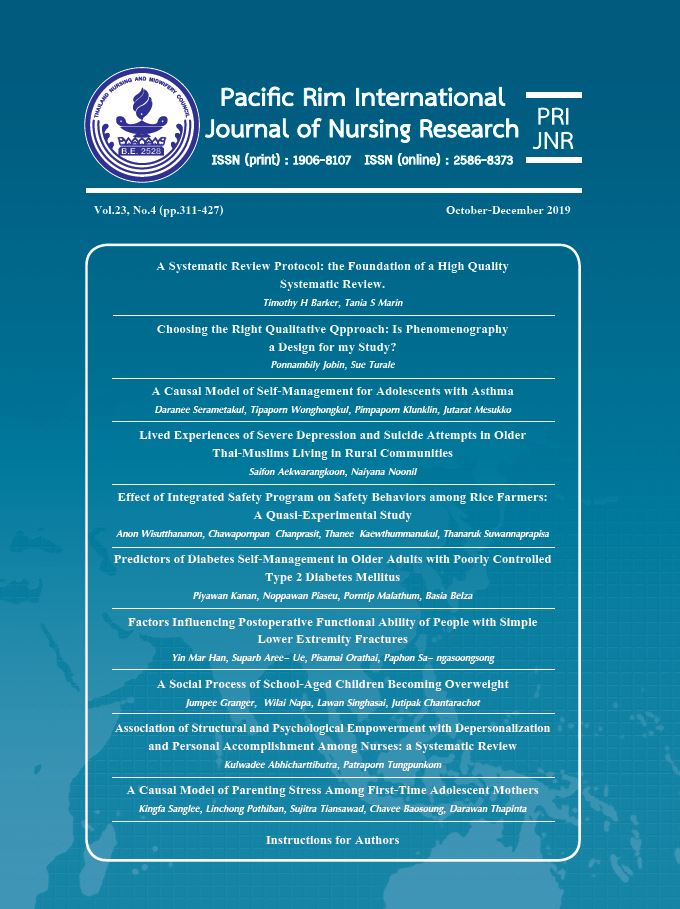Choosing the Right Qualitative Approach: Is Phenomenography a Design for my Study?
References
1. Cutler, N. A. Moxham, L., Stephens, M. Phenomenography: Alignment with personal recovery in mental health nursing. B J of Mental Health Nurs, 2017;6(5), 234-238.
2. Marton F. Phenomenography: a research approach to investigating different understandings of reality. J of Thought.1986;21(3):28 - 49.
3. Forster, M. Data-analysis issues in a phenomenographic investigation of information literacy in nursing Nurse Researcher. 2013, 21, 2, 30-34. doi: 10.7748/nr 2013. 11.21.2.30.e329
4. Sjöström B, Dahlgren LO. Applying phenomenography in nursing research. J Adv Nurs. 2002;40(3):339–45.
5. Bowden J. The nature of phenomenographic research. In J. Bowden & E. Walsh. Melbourne: RMIT University Press;2000,pp. 1-18.
6. Assarroudi A, Heydari A. Phenomenography: A mixed method in medical research. Acta Facultatis Medicae Naissensis [Internet]. 2016 Sep 1 [cited 2018 Aug 22]; 33(3):217–25. Available from: http://content.sciendo. com/view/journals/afmnai/33/3/article-p217.xml
7. Röing M, Holmström IK, Larsson J.A. Metasynthesis of phenomenographic articles on understandings of work among healthcare professionals. Qual Health Res [Internet]. 2018 Jan 1 [cited 2018 Sep 14];28(2):273–91. Available from: https://doi.org/10.1177/1049732317719433
8. Marton F, Booth S. Learning and awareness. New Jersey: Lawrence Erlbaum Associates;1997. Vol. 23 No. 4 319
9. Diaz S, Walsh A. Promoting evidence-based practice and information literacy through an undergraduate nursing journal club. Pennsylvania Libraries: Research & Practice [Internet]. 2018 May 22 [cited 2018 Sep 14];6(1):23–38. Available from: http://www.palrap.org/ojs/index.php/ palrap/article/view/171.
10. Richards DA, Hanssen TA, Borglin G. The Second Triennial Systematic Literature Review of European Nursing Research: Impact on patient outcomes and implications for evidence-based practice. Worldviews on Evidence-Based Nurs [Internet]. [cited 2018 Sep 14];0(0). Available from: https://sigmapubs.online library.wiley.com/doi/abs/10.1111/wvn.12320
11. Persson U, Carlson E. Conceptions of professional work in contemporary health care—Perspectives from registered nurses in somatic care: A phenomenographic study. J of Clin Nurs [Internet]. [cited 2018 Sep 14];0(0). Available from: https://onlinelibrary.wiley.com/doi/abs/10. 1111/jocn.14628
12. Åkerlind GS. Variation and commonality in phenomenographic research methods. Higher Ed Res & Develop.2005; 24(4):321-334.
13. Persson U, Carlson E. Conceptions of professional work in contemporary health care—Perspectives from registered nurses in somatic care: A phenomenographic study. J of Clin Nurs [Internet]. [cited 2018 Sep 14];0(0). Available from: https://onlinelibrary.wiley.com/doi/abs/10. 1111/jocn.14628
14. Larsson J, Holmström I. Phenomenographic or phenomenological analysis: does it matter? Examples from a study on anaesthesiologists’ work. Intern J of Qual Studies on Health and Well-being [Internet]. 2007 Jan [cited 2018 Sep 13];2(1):55–64. Available from: https://www. tandfonline.com/doi/full/10.1080/1748262060106 8105
2. Marton F. Phenomenography: a research approach to investigating different understandings of reality. J of Thought.1986;21(3):28 - 49.
3. Forster, M. Data-analysis issues in a phenomenographic investigation of information literacy in nursing Nurse Researcher. 2013, 21, 2, 30-34. doi: 10.7748/nr 2013. 11.21.2.30.e329
4. Sjöström B, Dahlgren LO. Applying phenomenography in nursing research. J Adv Nurs. 2002;40(3):339–45.
5. Bowden J. The nature of phenomenographic research. In J. Bowden & E. Walsh. Melbourne: RMIT University Press;2000,pp. 1-18.
6. Assarroudi A, Heydari A. Phenomenography: A mixed method in medical research. Acta Facultatis Medicae Naissensis [Internet]. 2016 Sep 1 [cited 2018 Aug 22]; 33(3):217–25. Available from: http://content.sciendo. com/view/journals/afmnai/33/3/article-p217.xml
7. Röing M, Holmström IK, Larsson J.A. Metasynthesis of phenomenographic articles on understandings of work among healthcare professionals. Qual Health Res [Internet]. 2018 Jan 1 [cited 2018 Sep 14];28(2):273–91. Available from: https://doi.org/10.1177/1049732317719433
8. Marton F, Booth S. Learning and awareness. New Jersey: Lawrence Erlbaum Associates;1997. Vol. 23 No. 4 319
9. Diaz S, Walsh A. Promoting evidence-based practice and information literacy through an undergraduate nursing journal club. Pennsylvania Libraries: Research & Practice [Internet]. 2018 May 22 [cited 2018 Sep 14];6(1):23–38. Available from: http://www.palrap.org/ojs/index.php/ palrap/article/view/171.
10. Richards DA, Hanssen TA, Borglin G. The Second Triennial Systematic Literature Review of European Nursing Research: Impact on patient outcomes and implications for evidence-based practice. Worldviews on Evidence-Based Nurs [Internet]. [cited 2018 Sep 14];0(0). Available from: https://sigmapubs.online library.wiley.com/doi/abs/10.1111/wvn.12320
11. Persson U, Carlson E. Conceptions of professional work in contemporary health care—Perspectives from registered nurses in somatic care: A phenomenographic study. J of Clin Nurs [Internet]. [cited 2018 Sep 14];0(0). Available from: https://onlinelibrary.wiley.com/doi/abs/10. 1111/jocn.14628
12. Åkerlind GS. Variation and commonality in phenomenographic research methods. Higher Ed Res & Develop.2005; 24(4):321-334.
13. Persson U, Carlson E. Conceptions of professional work in contemporary health care—Perspectives from registered nurses in somatic care: A phenomenographic study. J of Clin Nurs [Internet]. [cited 2018 Sep 14];0(0). Available from: https://onlinelibrary.wiley.com/doi/abs/10. 1111/jocn.14628
14. Larsson J, Holmström I. Phenomenographic or phenomenological analysis: does it matter? Examples from a study on anaesthesiologists’ work. Intern J of Qual Studies on Health and Well-being [Internet]. 2007 Jan [cited 2018 Sep 13];2(1):55–64. Available from: https://www. tandfonline.com/doi/full/10.1080/1748262060106 8105
Downloads
Published
2019-09-16
How to Cite
1.
Jobin P, Turale S. Choosing the Right Qualitative Approach: Is Phenomenography a Design for my Study?. PRIJNR [internet]. 2019 Sep. 16 [cited 2026 Feb. 15];23(4):314-9. available from: https://he02.tci-thaijo.org/index.php/PRIJNR/article/view/216447
Issue
Section
Editorial
License
Copyright: The Pacific Rim International Journal of Nursing Research, Thailand Nursing & Midwifery Council has exclusive rights to publish, reproduce and distribute the manuscript and all contents therein.








.png)



